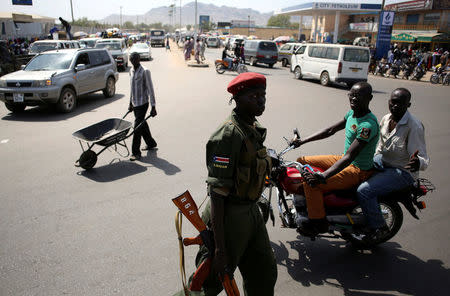Facing crime wave, residents in South Sudan capital pay police for protection
By Denis Dumo JUBA (Reuters) - Residents of South Sudan's capital say they are collecting cash to pay police unofficially to patrol their neighbourhoods, amid a crime wave and a cash crunch that means authorities often cannot pay their wages. Robbers killed more than 60 people last month in Juba, twice as many as in July, according to the Community Empowerment of Progress Organisation, a civil society organisation in Juba that tallies violent incidents. In one incident this month, around 50 gunmen in army uniforms attacked homes. Armed residents repulsed them and there were no known casualties, the organisation said. It was unclear whether the attackers were members of the security forces. Edmund Yakani, head of the Progress Organisation, said security was improving in some areas since communities began collecting cash to pay for police patrols. South Sudan's nearly four-year-old civil war has slashed oil production and the cash-strapped government struggles to pay security forces. It has asked foreign donors for help, but the request is unlikely to be granted since rights groups accuse security forces of torturing, raping and killing civilians. The war has displaced a third of the East African nation's 12 million people and spilt into neighbouring states. At a community meeting last week in the Juba neighbourhood of Kator East, dozens of residents each agreed to give 100 South Sudanese pounds (just under $1) to hire police to join youth volunteers in patrolling, said Lucy Ramada, 38. "Every household was asked to contribute ... for the payment of extra police personnel that will assist our youth at night," she said. Since the patrols began with the paid police, she added, "there is no sound of gunfire and no robberies". Police spokesman Daniel Boulogne said he was unaware of residents offering police extra pay. A South Sudanese police officer is paid about 1,500 South Sudanese pounds on average, about $83 (61.14 pounds) at the current exchange rate. "We have not asked for any (extra) incentives because it is our duty to do our best to give them security," he said. He did not comment on police wages. Monthly inflation has reached triple digits, and the scramble for food forces many people into crime, said James Okuk, a lecturer at Juba University. "The situation is forcing people to become robbers," he said. "The situation has been made worse by the government not paying salaries to its employees, including those carrying guns, for some months." Defence Minister Kuol Manyang Juuk told Reuters that some members of the army and police were under investigation for robbery but the number was small. (Editing by Andrew Roche)

 Yahoo News
Yahoo News 

